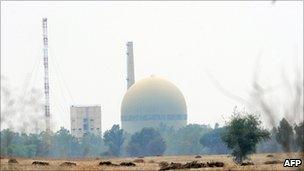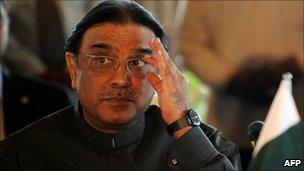Wikileaks US cables: Pakistan rejects nuclear arms fear
- Published

Pakistan says there have been no incidents involving its fissile material
Pakistan has dismissed fears - aired in US diplomatic cables released by Wikileaks website - that its nuclear material may fall into terrorist hands.
High Commissioner to the UK Wajid Shamsul Hasan said the material had a "foolproof control and command system".
The cables warn Pakistan is rapidly building its nuclear stockpile despite the country's growing instability.
US online shopping giant Amazon has reportedly blocked Wikileaks from its servers - a move welcomed by officials.
Access to Wikileaks' homepage was sporadic on Wednesday. The website had been using Amazon servers since its Swedish-based servers came under cyber-attack twice earlier this week.
"I call on any other company or organisation that is hosting Wikileaks to immediately terminate its relationship with them," said Sen Joe Lieberman, the Senate Homeland Security Committee chairman.
Amazon has not commented on the reports, which Wikileaks appeared to confirm with an entry on its Twitter feed which read: "Servers at Amazon ousted. Free speech the land of the free."
The BBC's Iain Mackenzie in Washington says there is a feeling in some quarters Amazon may have been susceptible to pressure from the administration.
Wikileaks has so far posted only 505 of the 251,287 messages, external it says it has obtained. However, all of the messages have been made available to five publications, including the New York Times, external and the Guardian.
In other developments, Interpol has issued a notice asking for information on the whereabouts of Wikileaks founder Julian Assange and the US has appointed an anti-terrorism expert to lead efforts to tackle damage caused by the documents' release.
The White House said Russell Travers would be responsible for identifying areas of structural reform needed in the wake of the leaks, advising on mitigation measures and making policy recommendations.
'Sovereign nation'
Speaking to BBC Radio 4's Today, external programme, Mr Hasan said the fears expressed in the cables came "off and on" but added: "We have always been telling them straight forward that [the nuclear weapons] are in secure hands, they don't have to worry about it and we will protect them.
"They are the dearest assets that we have and we'll not allow anything to fall into any adventurer's hands."
In one of the latest cables to be released by Wikileaks, senior UK Foreign Office official Mariot Leslie told US diplomats in September 2009 that Britain had "deep concerns about the safety and security of Pakistan's nuclear weapons", external.
In another cable seven months earlier, then-US ambassador Anne Patterson told Washington: "Our major concern is not having an Islamic militant steal an entire weapon but rather the chance someone working in the government of Pakistan facilities could gradually smuggle enough material out to eventually make a weapon, external."
Another cable concerning a US intelligence briefing in 2008 said: "Despite pending economic catastrophe, Pakistan is producing nuclear weapons at a faster rate than any other country in the world, external."
Mr Hasan said that since the government of President Asif Ali Zardari had come to power 27 months ago "we have had a very successful, foolproof control and command system looking after the nuclear arsenal".
Mr Hasan admitted the leaks were harmful.
"You are dealing with the relationship with states. You have built them over the years and all of a sudden something gets out - it's top secret, it's classified, it harms the relationship," he said.
Mr Hasan also said Pakistan would not accept any US help on nuclear security "because we are a sovereign nation".
There is also scepticism about whether Pakistan could cut links to militants.
In the leaked material Ms Patterson also said there was "no chance" of Pakistan "abandoning support for [militant] groups".
The Pakistan government, she added, saw militant groups "as an important part of its national security apparatus against India".

The cables question Mr Zardari's relationship with the military
The US also expressed concern about tensions between the powerful Pakistani army and Mr Zardari.
In material from March 2009, US cables noted that army chief Gen Ashfaq Parvez Kayani might "however reluctantly" put pressure on President Zardari to step down, although he "distrusted [opposition leader] Nawaz [Sharif] even more".
The BBC's Aleem Maqbool in Islamabad says military officials here believe the Wikileaks disclosures are being used as a stick with which to bully Pakistan into giving up its nuclear programme.
But he says there are many observers who will see the concerns raised as valid, particularly considering the tens of thousands of people in Pakistan whose work is connected to the nuclear programme.
US State Department spokesman Phillip J Crowley says Pakistan has to continue to take action against insurgents
US State Department spokesman PJ Crowley told BBC World News on Wednesday that Pakistan should take further action against militant groups.
"We have seen aggressive action by the Pakistani government and we have also made clear to Pakistan that it has to make sure that whatever relationship has existed in the past, they need to sever these kinds of relationships and continue to take aggressive action," he said.
'Red Notice'
The US has condemned the Wikileaks disclosures, published by the UK Guardian newspaper, external, as an attack on the world community.
On Wednesday, US Secretary of State Hillary Clinton, who is in Kazakhstan for the Organisation for Security and Co-operation in Europe (OSCE) summit, said she had raised the issue with the leaders she had met and none had expressed any concerns about continuing diplomatic work with the US.
The communications between the US State Department and its embassies and consulates around the world were sent between 1966 and 2010.
No-one has been charged with passing them to Wikileaks, but suspicion has fallen on US Army Private Bradley Manning, an intelligence analyst arrested in Iraq in June and charged over an earlier leak of a classified video.
The cables release is the third mass Wikileaks publication of classified documents; it published 77,000 secret US files on the Afghan conflict in July, and 400,000 documents about the Iraq war in October.
Meanwhile, Interpol has issued a "Red Notice" asking people to contact the police if they have any information about Mr Assange's whereabouts.
It said the Australian was wanted for questioning in Sweden over an alleged sex offence, which he has denied.